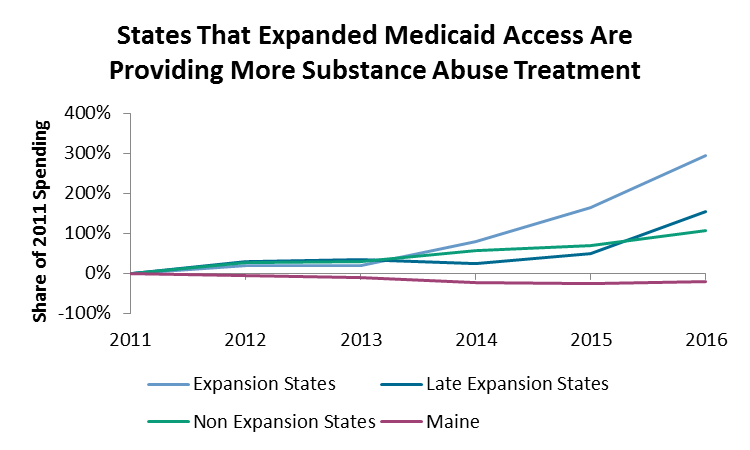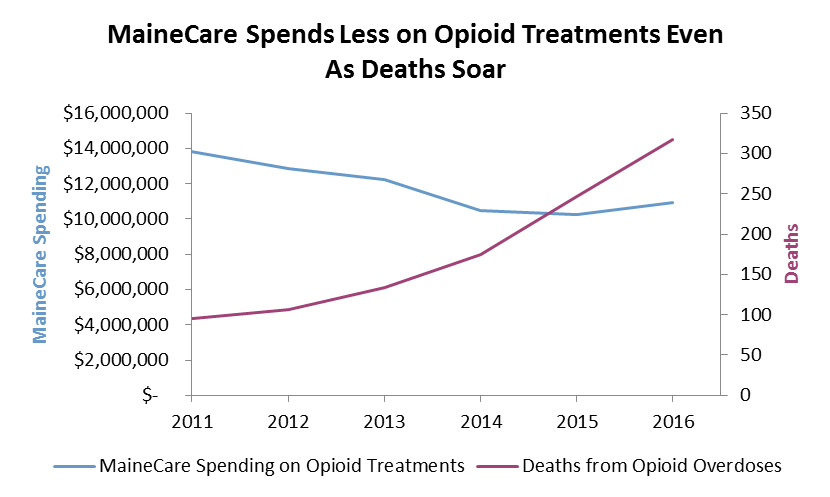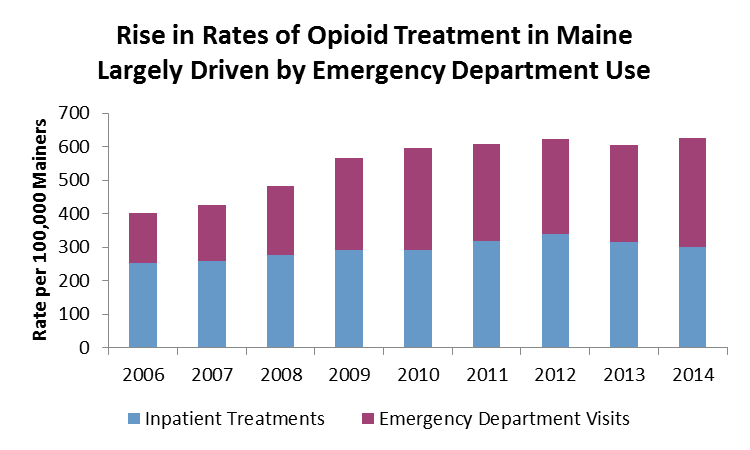Across the United States, Medicaid is playing a crucial role in responding to the fight against the opioid crisis—except in Maine—where one person per day is dying from a drug-related overdose, most of which are caused by opioid use. That’s the stark conclusion to be drawn from data presented in a new report from the Urban Institute, which shows Medicaid spending on anti-addiction medications up 155% nationally in the past five years, but down 21% in Maine over the same period. In fact, Maine and Tennessee are the only two states whose Medicaid spending on buprenorphine, naltrexone, and naloxone declined between 2011 and 2016. Maine’s status as an outlier matches the LePage administration’s decision to not only refuse to accept federal funding to cover more low-income people in Maine’s Medicaid program, but to actively make it harder for Mainers living in or near poverty to get health care.
Medicaid plays an important role in providing health care to low-income Americans, which includes millions grappling with substance use disorder. The expansion of Medicaid eligibility under the Affordable Care Act allows the program to cover individuals in households with earnings up to 138% of the federal poverty level. Data analyzed by the Urban Institute show that while spending on anti-addiction drugs increased in nearly all states during this period, it increased especially quickly in states that expanded Medicaid eligibility. That’s because these states cover more low-income individuals and more people suffering from opioid addiction are able to access treatment.

As MECEP has reported before, Maine’s health care infrastructure has been heading in the wrong direction under the LePage administration. It is one of a tiny number of states that has restricted, rather than increased, access to Medicaid since 2011. The data gathered by the Urban Institute show that Maine is similarly negligent in failing to provide Medicaid treatment for opioid abuse. Separate data on all opioid treatment in Maine show that the demand for opioid treatment has not declined alongside Medicaid spending in the state. In fact, demand is higher than ever. Between 2011 and 2014, MaineCare spending declined 24%, even as the number of deaths from opioid overdoses increased 300%.

The LePage administration’s failure to address the opioid crisis through MaineCare means that Mainers suffering from addiction aren’t receiving the care they need, with tragic consequences. While the share of Mainers receiving treatment has increased substantially in recent years, that increase has been driven almost entirely by increased use of emergency departments across the state. Mainers seeking treatment in the emergency room are more likely to be treated purely for overdoses, rather than long-term addiction therapy in an in-patient setting. Worse, without access to insurance, more Mainers will forgo in-patient care because of its cost, and the cycle of addiction, overdose, and even death, will continue. In 2011, 95 Mainers died from opioid-induced overdoses; by 2016, that number had increased to 317.

Maine’s top priority must be access to treatment for all Mainers. That means ensuring that treatment is affordable, either through health insurance coverage, or MaineCare coverage for the most vulnerable, so they can receive proper care. Expanding Medicaid to another 70,000 low-income Mainers by increasing the income eligibility limit will increase access to treatment for thousands of Mainers and help us fight back against the opioid crisis that threatens lives, families, and our economy.
Maine voters have the opportunity to act where the governor has failed and expand treatment to Mainers addicted to opioids. This November, when Mainers go to the polls, they can vote to accept federal funding for enhanced MaineCare access and help save hundreds of lives.



